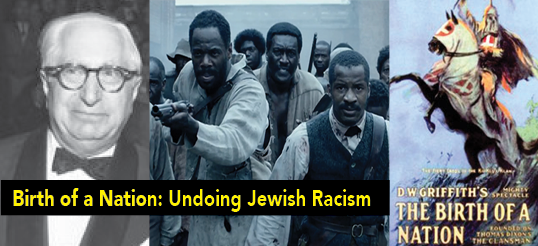Birth of a Nation: Undoing Jewish Racism
“Most Black Americans would be shocked to learn that it was Jewish investors who financed the 1915 production of the most racist movie ever made—Birth of a Nation—a movie that glorifies anti-Black violence and deifies the Ku Klux Klan.”
The new movie The Birth of a Nation is generating immense controversy, but is that firestorm also a deliberate diversion from the ugly history surrounding the 1915 motion picture of the same name? In a vivid big-screen extravaganza, writer and director Nate Parker recounts the 1831 Virginia revolt led by the great Black freedom-fighter Nat Turner. In so doing, Parker boldly snatched the iconic title from the 1915 silent film, a film that did more for white supremacy than any other single force in America. Amidst the growing racial unrest in a contentious political season—including race revolts by NFL stars, vicious anti-immigrant and Islamaphobic rhetoric and violence, and increasing white militancy—the mission of the original Birth of a Nation film seems to have been fully realized.
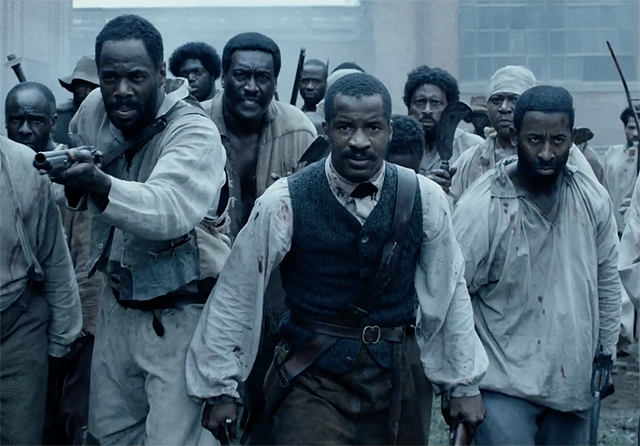
Around 1915, immigrants from Europe were flooding into an America still smarting from civil war and emancipation. The terrorist Ku Klux Klan of the 1860s and 1870s had done its job in forcing Blacks back onto the cotton plantations as sharecroppers; thus, when Reconstruction ended, the Ku Kluxers retired as heroes and were effortlessly absorbed into the American mainstream. But forty years later, Blacks had had enough of the lynching and violence in force to keep them in their prescribed place at the bottom of white society and were becoming more vocal and militant in demanding their human rights. Whites were not going to tolerate this and so the KKK was re-formed in response. And the driving force behind the reconstituted Ku Klux Klan was the 1915 release of D.W. Griffith’s silent movie epic The Birth of a Nation.
The movie adaptation of the Rev. Thomas Dixon’s book The Clansman was America’s first movie blockbuster, and it effectively presented the Klan’s racial philosophy as righteous, inspirational, and as American as apple pie. The Rev. Dixon’s book is filled with hateful passages like this gem:
“For a thick-lipped, flat-nosed, spindle-shanked Negro, exuding his nauseous animal odor, to shout in derision over the hearths and homes of white men and women is an atrocity too monstrous for belief….We sink to his level if you walk as his equal in physical contact with him. His race is not an infant, it is a degenerate.”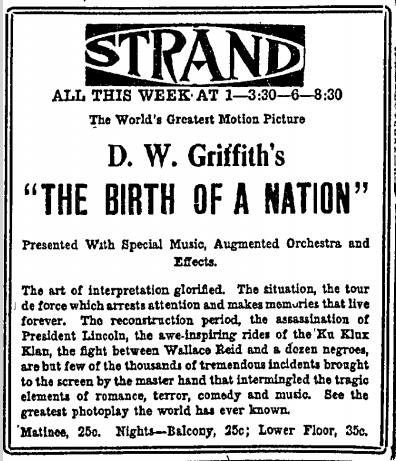
Using revolutionary techniques in cinematography, the film captivated the white American imagination and transformed the Klan’s trail of hate crimes into a heroic heritage, all sold—in one viewing—to a massive international audience. As a silent movie it was far-reaching in its effect: Its hateful imagery reached immigrants of ALL languages and cultures and gave them their clearest orientation to America’s racial reality.
The Southern Poverty Law Center’s 1991 publication Ku Klux Klan: A History of Racism and Violence accurately describes the significance of The Birth of a Nation:
“So powerful was the impact of the movie in 1915 that it is often credited with setting the stage for the Klan revival that same year. In fact, the man who actually created the 20th century Klan…used the publicity surrounding it to win recruits to his organization….Birth of a Nation is so blatantly racist that it is rarely shown in public theaters today….The racial hatred exhibited in the movie, once acceptable, is now abhorrent to all but the Klan and the most extreme bigots.”
According to scholar John C. Inscoe, Dixon stated openly that his purpose was “to create a feeling of abhorrence in white people, especially white women, against colored men” and that he hoped the film would accomplish his plan “to have all Negroes removed from the United States.”
The Jewish Role in Birth of a Nation
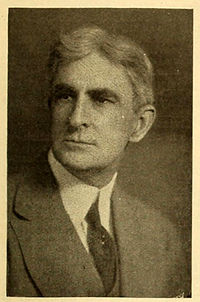
Most Black Americans would be shocked to learn that it was Jewish investors who financed the production of what the SPLC argues was the most racist movie ever made—a movie that glorifies anti-Black violence and deifies the Ku Klux Klan. The Jewish businessmen, nearly all of whom were mercantile Jews in Boston, could not have been deceived by the movie’s noted director D.W. Griffith, because they invested when the working title was The Clansman. Among them were lawyer David Stoneman, rug merchant Colman Levin, another jeweler, and even his secretary.
One writer said that the film’s effect was “to arouse in the audience a strong sense of the evil possibilities of the Negro” and that “Mr. Dixon had identified the Negro with cruelty, superstition, insolence and lust.” A Boston judge called the film “three miles of filth,” having no other purpose but to stir up the people of the North so that “they would consent to allowing the Southern programme of disfranchisement, segregation and lynching of the Negro.” Jews were undeterred. According to Jewish film historian Neal Gabler, the Jewish investors “seemed less concerned about being tainted by the movies than they were about making a profit.”
The Jewish press was of like mind. The American Jewish World dismissed criticism of the film, calling it “a compliment to the black man of today.” The Pittsburgh Jewish Criterion extolled the “great” film in its October 1, 1915, edition. And why wouldn’t they? Like so many notable Southerners, Thomas Dixon was a violently anti-Black racist and an effusively admiring Judeophile. He considered the Jews “the greatest race of people God has ever created.” No parallel existed for the film and the publicity that attended it—until Adolf Hitler’s propaganda ministry began in Nazi Germany a generation later. Jewish promoters greatly enhanced The Birth of a Nation’s distribution worldwide, and the greatest of the Hollywood movie studios, Metro Goldwyn Mayer (MGM), was started by the famous Jewish mogul Louis B. Mayer with the $500,000 in profits he earned from distributing the film on the east coast. The overt racism in the film only whet his appetite, and the controversy generated by the NAACP protests in Mayer’s mind “would further enhance people’s desire to see it.”
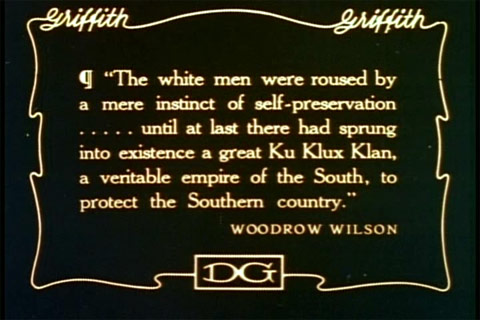
The state with the most lynchings was Georgia. The movie opened in Atlanta on December 6, 1915, to rave reviews and general excitement. And most of that excitement was had by the owners of the Atlanta Theater, two Jews—Marcus Klaw and Abraham L. Erlanger—who held a virtual monopoly of theaters in the South. Incredibly, the opening of the movie took place just four months after the Georgia lynching of Jewish businessman Leo Frank, the only Jew ever lynched in America! They made a record $27,000 on the Atlanta showing of The Birth of a Nation ($650,000 today), the most ever in any Southern theater. It is they—Klaw and Erlanger—who staged the hate extravaganza requiring a crew of fifty men, including a full symphony orchestra. Thus 80,000 Georgians saw the most effective Ku Klux Klan recruitment film because Jewish businessmen made it possible.
The Jewish theater owners brought the movie back the next year, and at the opening 1,000 Klan admirers had to be turned away. They even cut the admission price in half so that local Atlanta school children could attend. And though Klaw and Erlanger were based in New York, prominent Jews in Atlanta assisted in the success of the engagement. The Jewish managing editor of the Atlanta Constitution, Jacob Gortatowsky, ran many stories trumpeting the film’s arrival, including a giant 2-page spread with a montage of all the glowing reviews by other newspapers.
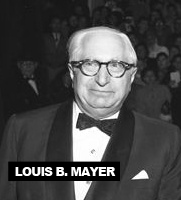
Accompanying this collection of white newspaper movie reviews were large advertisements by Atlanta’s major Jewish retailers, such as Rich’s, Regenstein’s, and Myers & Miller stores, all displayed prominently next to a story about the local KKK meeting—on the Constitution’s society page. Rothschild’s shoes and L.C. Adler’s ties were advertised right below an article titled “Birth of a Nation Thrills Tremendous Atlanta Audience.” The Atlanta Journal advertised the film on the same page that it announced the 18 newly elected officers of the Jewish Progressive Club. Atlanta’s top pharmacy chain, the Jewish-owned Jacobs Drugstore, advertised that it would be selling Thomas Dixon’s novel Clansman.
All of this is unsurprising, given the fact that thousands of Jewish soldiers fought for the slaveholders in the American Civil War, and a Jewish owner of a 140-slave plantation—Louisiana’s Judah P. Benjamin—was not only the secretary of state for the Confederacy but also the financier of the original Ku Klux Klan.
No force in history had a greater effect in glorifying the Ku Klux Klan and imprinting on the world’s mind the negative image of the Black man than Griffith’s Jewish-funded KKK propaganda film. However, the new movie with the same name certainly intends to reverse the effect of the Jews’ 1915 “contribution” to American race relations. In 2016, are those working so hard to undermine the revolutionary message of The Birth of a Nation the very same people who in 1915 made the Black man the scorn of the world?
[Sources: John C. Inscoe, “The Clansman on Stage and Screen: North Carolina Reacts,” North Carolina Historical Review, Vol. 64, No. 2 (April 1987): 148; The Secret Relationship Between Blacks & Jews, Volume 3: The Leo Frank Case].

